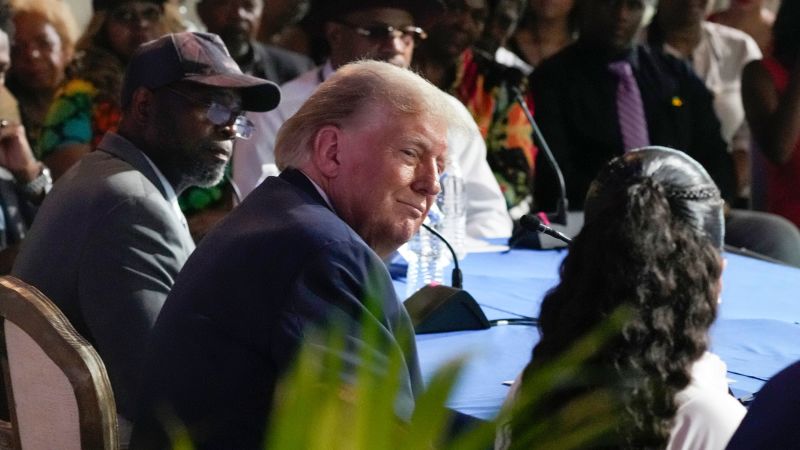Donald Trump’s campaign recently launched a coalition group targeting Black voters in an attempt to win over a segment of the electorate that historically supports Democrats. This was evident as Trump campaigned in Detroit and held a community roundtable at the predominantly Black 180 Church, where he was joined by two Black Republicans, Florida Rep. Byron Donalds and former HUD Secretary Ben Carson, for the launch of the “Black Americans for Trump” group. Both Donalds and Carson are reportedly under consideration to be Trump’s running mate, with Trump praising Donalds as an “incredible guy” and suggesting he could be a good vice president.
Polls have shown that Black men are more open to supporting the Republican nominee in this year’s election than in the past. A New York Times/Siena College survey of battleground states revealed that Trump was winning over more than 20% of Black voters in a two-way matchup with Biden, a potential historic high if it translates to votes in November. Trump won about 10% of Black voters nationally in 2020, suggesting a potential shift in Black voter support in key battleground states like Michigan, Georgia, and Pennsylvania.
In contrast to his efforts to court Black voters, Trump has a history of harsh criticism towards cities with large Black populations. His comments in 2019 referring to Baltimore as a “disgusting, rat and rodent infested mess” and recent remarks about Milwaukee have drawn criticism. Trump has defended himself against accusations of racism by pointing to his Black friends who support him, but the Biden campaign has dismissed this as an attempt to excuse a lifetime of disrespect towards Black Americans. Trump also inaccurately accused Biden of using the term “super predators” in relation to the 1994 crime bill, which Biden did not publicly endorse or deploy.
Trump has claimed that he has done more for the Black population than any American president since Abraham Lincoln, while accusing Biden of doing nothing for the Black community. At a convention in Detroit hosted by Turning Point Action, Carson praised Trump’s ability to engage with Black communities, emphasizing that Trump is not a typical politician who follows the political wind. This reflects the Trump campaign’s efforts to appeal to Black voters and position Trump as a candidate who has their best interests at heart.
Overall, Trump’s attempts to court Black voters through the “Black Americans for Trump” coalition and his rhetoric highlighting Biden’s perceived failures in supporting the Black community reflect the importance of Black voter support in the upcoming election. While Biden is still expected to win Black voters by a large margin, any shift in Black voter support towards Trump could impact the outcome in crucial battleground states. Trump’s focus on engaging with and addressing the concerns of Black voters suggests a strategic effort to broaden his appeal and potentially sway key demographics in his favor as the election approaches.



